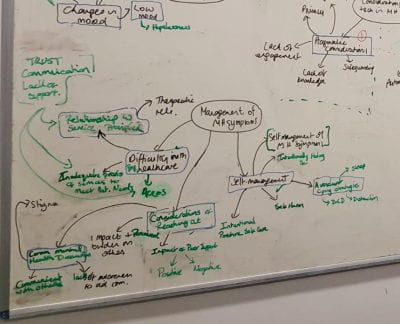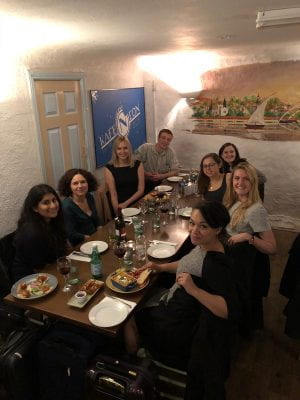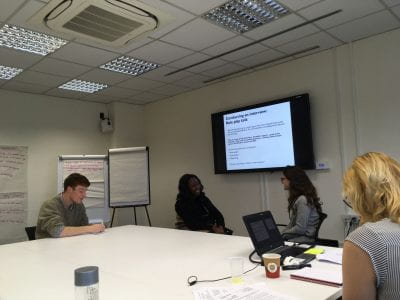Reflections and recommendations on co-producing with young people with past mental health difficulties
By Niccola, on 9 July 2020
UCL Centre for Co-production co-producers Lindsay Dewa and Anna Lawrence-Jones share their recently launched co-produced research paper and tell us about how the team worked together and all the things that they learnt.
Back in 2018, we were lucky enough to be one of the first pilot projects funded by the UCL Centre for Co-production. We held a sandpit innovation workshop which was all about bringing different people together for a two-day interactive workshop to come up with innovative ideas for projects around hearing loss. Please read a previous blog we wrote about our co-produced project to find out more. Since then we’ve come along to lots of the Centre’s sessions, always learning, sharing and making new connections.
During the same time, Lindsay was leading a qualitative project exploring young people’s perceptions of using technology to detect deteriorating mental health (you can read the research paper, if you’d like to). From the start, we wanted to ensure we had meaningful patient and public involvement throughout. Young people worked with us to come up with the research question building on the McPin Foundation Priority Setting Partnership on children and young people’s mental health, in partnership with James Lind Alliance. Young people were involved in the design, ethics, management, decision-making, data collection, analysis and dissemination stages. The longer we worked with the UCL Centre for Co-production, the more we realised we were actually doing co-production!
In Co-production Week (6-10 July 2020), we wanted to share with you our recently published co-production paper. This is separate to the research paper and reports against the principles of co-production and co-authored with three young people! We hope it’s useful for all the co-producers out there! We wanted to write something practical and this blog summarises our key recommendations.
Who did we co-produce with?
We recruited seven young people with past experience of mental health difficulties to a Young People’s Advisory Group (YPAG). Three became co-researchers and were involved in every stage of the project, including conducting interviews with young people with current mental health difficulties and coding the interview transcripts. To up-skill the co-researchers, they underwent two full days of face-to-face training focused on theory and hands-on practice. We acted out different interview scenarios and the co-researchers fed back how Lindsay, as the interviewer, handled different situations. Then the young people took turns as an interviewer and interviewee. They also observed each other to debrief on how it went. After the training, they were given homework to familiarise themselves with the interview questions and topic guide, and to practice interviews with friends.
During the data collection stage, they first shadowed the researcher carrying out an interview, then were shadowed doing an interview and then did an interview alone. After each interview we reflected, gave personalised feedback, including what went well and what improvements could be made, and discussed any safeguarding issues. The debrief was usually in a local cafe over a coffee! We had a clinician on call during the interviews, in case the co-researchers or participants needed support.
What was the impact?
We found it really valuable to self-reflect, using a programme called Evernote throughout the project. We also gathered feedback from the young people (either through feedback forms or discussions) about their experience at each research stage; their views on how they thought they impacted the research; and, what we could have done differently to support them. The co-researchers gained new skills, grew in confidence and co-presented with us at an international conference.
“It also really impacted me; knowing you’ve played a part in something that will likely affect others going through what you’ve been through is a really rewarding experience. And off the back of this project, I’ve actually started computer coding and will be starting a master’s in computer science.” Quote from co-researcher, Caroline.
The co-researchers came up with novel ways of recruiting research participants, such as a lunch meet and greet in a mental health setting, as they said if it had been them, they would have been encouraged to sign up if they had an opportunity to meet the researchers and ask questions before the interview. Research impact was demonstrated by the co-researchers’ ability to rapidly develop a rapport with interviewees, appropriately probe deeper during the interviews and understand terminology that surfaced, due to their personal experiences. During the data analysis stage, when we develop codes (a word or phrase to summarise or tag a section of the interview data) and co-produced the thematic map, there were many new codes that the young people added, removed or edited from the researchers’ ideas.

Our thematic map (a map showing themes) – the green text represents the changes from the young people
What did we learn?
This process taught us a lot. Some of the main things we learned were:
- It is important to build an environment that is safe and open. Offering support, taking time to build relationships and sharing things about yourself, allows others to open up.
- Regular communication is key. A WhatsApp group works well to not only build relationships, but puts all communication in one searchable thread, and allows everyone to be involved in decisions.
- There is a need to involve several service users, healthcare professionals and researchers, as co-production can be time-intensive. This also ensures key stakeholder voices are represented if anyone has competing commitments.
- The same co-researchers should be involved in the overall management and dissemination of the project, as well as doing the research, as they develop key knowledge of the project delivery.
- It is useful to have a sounding board to discuss challenges as they arise; this can be done between the lead researcher and patient involvement lead or a mentor external to the project. All projects might have different challenges due to co-production being about people and relationships.
- Get all team members to reflect throughout the process and feedback, so that issues are surfaced, any issues are addressed and impact of the co-production is captured.
- Ensure safeguarding for the co-researchers and participants, by having mental health first aiders and clinicians as part of your team.
- For interviews, co-researchers could be paired to participants with similar experiential knowledge, as they may be able to understand specific language in interviews more deeply and can therefore probe more. Co-researchers should code the interviews that they did.
- Recognise that it’s ok for some roles to fall to specific people due to their skills and capacity. For example, the lead researcher managed the budget and logistics, as well as the training so as not to burden the young people.
- It’s useful to have someone to help with all the logistics of organising meetings and paying the young people for their time. We felt that each task should be paid according to the INVOLVE guidelines.
- Have a flexible budget, as co-production often takes longer than you expect. The young people came up with new ideas as we went along.
This project was a brilliant opportunity for us to use learnings from our UCL Centre for Co-production Pilot project. We are already applying what we’ve learnt to our current project, the CCopeY study, which is exploring young people’s mental health and coping styles during and after the COVID-19 lockdown. Watch this space!
The study was run at the NIHR Imperial Patient Safety Translational Research Centre (funded by the National Institute for Health Research). Contact the research lead Lindsay at l.dewa@imperial.ac.uk if you would like to hear more.
 Close
Close




